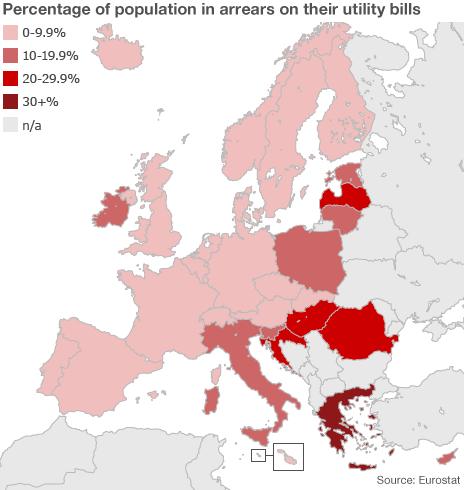Energy bills: Who pays the most in Europe?
- Published
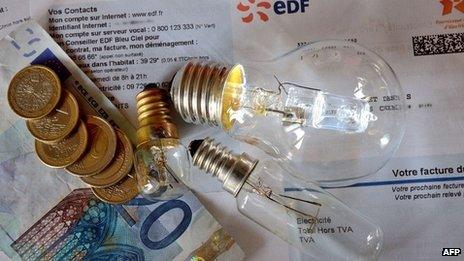
Electricity and gas prices vary wildly depending on where you live in Europe
High energy bills may top the political agenda in the UK, but households all over Europe are feeling the squeeze.
Since 2010, both gas and electricity prices have risen markedly, largely due to rises in wholesale prices on the back of the tentative global economic recovery and expectations of higher demand.
Electricity prices fell in the first half of the year, but this was simply a case of energy suppliers cutting prices after large increases in January.
The dip in gas prices has lasted longer, but even they are on the up again.

But as the chart below shows, Europe cannot be treated as a single entity, for there are massive differences between individual countries in what households pay for their power.
Energy think tank Vaasaett says that although its prices are specific to capital cities, the rankings shown below would not change if the country as a whole was substituted for the city.
Taking exchange rates out of the equation, Helsinki is the cheapest of the 23 European cities surveyed for electricity prices. Households in Berlin - the most expensive - pay two-and-a-half times as much, largely due to taxes and subsidies designed to boost renewable energy production.
In fact, almost a third of a Berliner's electricity bill comprises energy taxes. The equivalent figure for the UK is currently 9%, but this will fall - possibly by three or four percentage points - once energy suppliers pass on recently announced changes in green levies.
In the past month, prices have risen in seven cities, and nowhere more so than in London. This has sparked dismay among consumers and sparked heated political debate about how best to reduce bills - hence the reduction in green levies. And yet UK consumers are less active in changing energy companies than at any time since 1999 - when they were first free to pick and choose supplier - with just 10% of customers switching during the past year.
Even after the recent price rises, however, London remains one of the cheaper places to buy electricity, and below the European average.
But prices haven't been going up everywhere - electricity bills have fallen in nine cities in the past month, particularly in Central and Eastern Europe, with the Hungarian government reducing prices by 11% and its Croatian counterpart cutting them by 6%.
On average across Europe, the actual energy price component, including supplier profit margins, represents about 41% of a household's electricity bill, while distribution represents 33%, energy taxes 11% and sales tax 16%, according to Vaasaett.
In the UK, the price of energy including margins is 58%, distribution is 26%, energy taxes 11% and VAT 5%. Compare this with Copenhagen, where the cost of energy comprises less than a fifth of bills while taxes make up more than half.
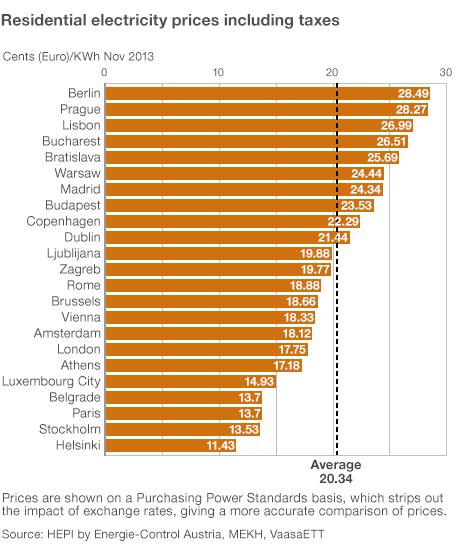
Gas prices also vary a great deal, with households in Stockholm - the most expensive city - paying three times more than those in the cheapest, Luxembourg City.
Stockholm is much more expensive than everywhere else simply because the gas market is so small - there are only 33,000 households buying gas in the whole of Sweden.
London is the second cheapest city, where households pay well below the European average, despite recent price rises. In the past month, seven countries have seen gas price rises, while eight have seen prices fall.
Across Europe, the actual wholesale gas price, together with suppliers' profit margins, represents 54% of an average gas bill, while distribution represents 23%, energy taxes 7% and sales tax 16%.
In the UK, the price of energy including margins makes up 67% of a gas bill, while distribution represents 23%, energy taxes 6% and VAT 5%.
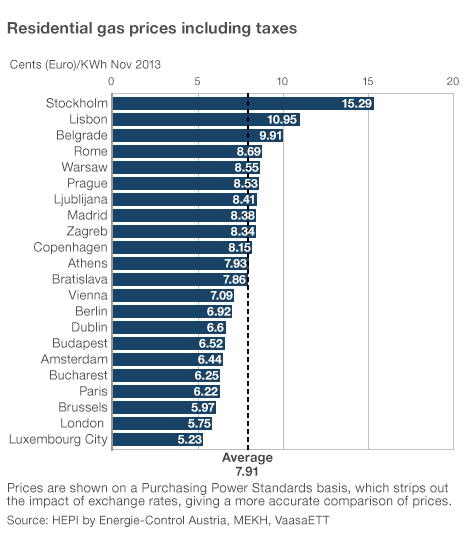
Of course prices must be seen in the context of people's ability to pay them, and fuel poverty is seen as a major concern within the UK, where 6.5% of the population say they cannot afford to keep their homes adequately warm, according to European Union figures.
But spare a thought for those living in Bulgaria, where almost half the population (47%) say they cannot afford to heat their homes properly. Many Lithuanians (34%), Cypriots (31%), Portuguese (27%) and Greeks (26%) in particular also struggle to keep their homes warm.
At the other end of the scale, less than 2% of Scandinavians cannot afford to keep warm at home. The average across the EU is about 11%.
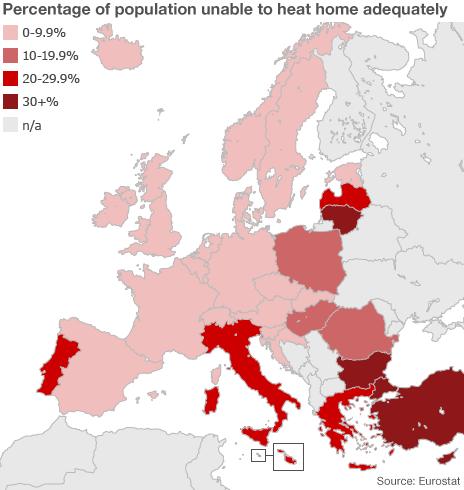
The figures for the proportion of people who are struggling to keep up with the energy bill payments are almost as startling.
Almost a third of Greeks (32%) are in arrears on their utility bills, while many Bulgarians, Croatians (both 28%), Romanians (27%) and Latvians (23%) also struggle to keep up with their payments.
In the UK, about 9% of the population are behind in their bill payments, compared with an average across the EU of about 10%.
Further energy price rises will simply ensure that even more households across Europe will struggle to keep up with their bill payments, and increase further the number that cannot afford to heat their homes properly this winter.
